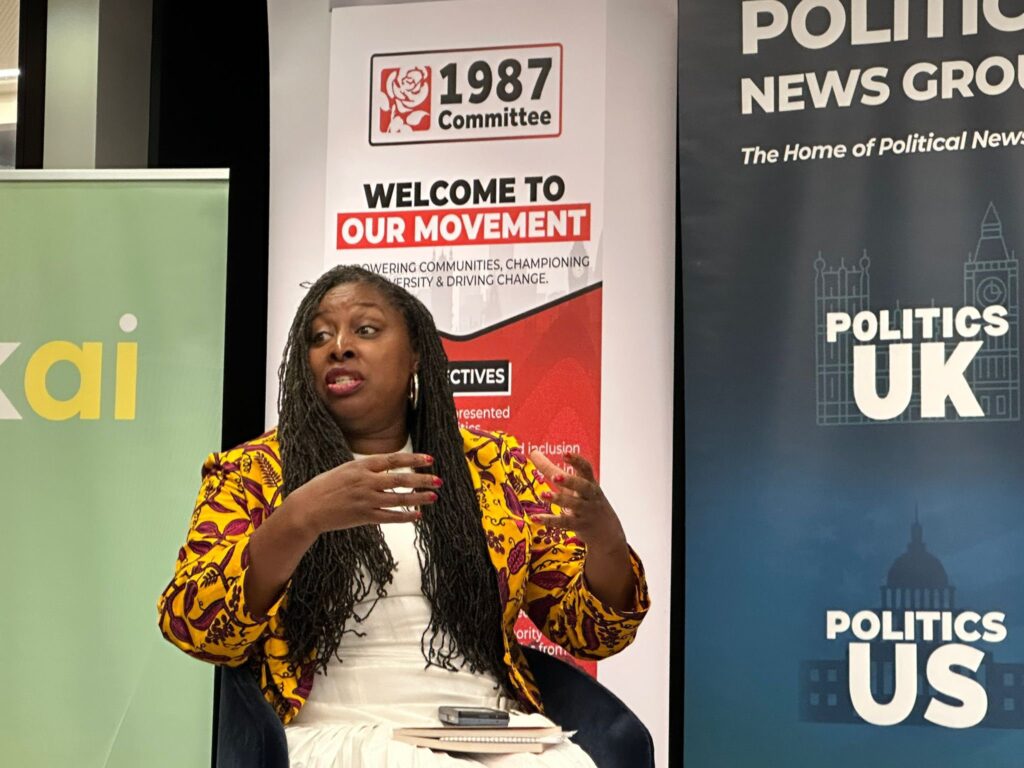Last week, Chamber UK, UKAI, and Politics UK, in partnership with commercial law firm Ashurst and the 1987 Committee, hosted an ‘in conversation’ event with Labour MP Dawn Butler. A range of topics were covered, including her aspirations of becoming London Mayor, the Labour Party’s ongoing deputy-leadership election, and the chaos artificial intelligence could cause in British politics.
The conversation began with Butler retelling her childhood, sharing formative moments from her East London upbringing that moulded her political worldview.
One such moment was when a teacher wrongfully accused her of lying, after she told classmates that she had seen a flying cockroach during a trip to Jamaica, and sent her out of the room. Rather than accept the charge, Butler ran home, climbed a fence, and fetched her father to back her up.
“Standing in your truth is important,” she told the audience, explaining that the episode informed her later willingness to call out dishonesty in politics—most famously in 2021 when she was ordered to leave the House of Commons after calling Boris Johnson a liar. Butler added that in the immediate aftermath of this incident, the Labour Party and her fellow MPs offered very little support, claiming that it was only after the clip went viral that they took her side, even launching a fundraising campaign off the back of it, something Butler branded ‘disgraceful.’
Butler, a self-proclaimed ‘daddy’s girl,’ then discussed how her ‘socialist’ father impacted her political leanings. When Margaret Thatcher cut free school milk, a move that delighted Butler at the time because she disliked it, her father reprimanded her. “It’s not about you,” he told her, reminding her that for many children, that milk might have been their only source of nutrition. “Those little incidents moulded who I am today,” she said.
However, despite these childhood events, Butler admitted that growing up she didn’t actually want to become a politician, saying politics was ‘never really (her) thing.’ Instead she pursued a career as a computer programmer, before moving on to working as a trade union official.
Part of her hesitance to get involved in politics was a lack of black, working class, female representation in Westminster. Butler says she assumed that one had to be ‘male, pale and stale’ to be a politician. Whilst she recognised the presence of Dianne Abbot, Britain’s first black female MP, Butler said that she did not feel Abbott represented her, because she was ‘posher’ than her.
However, eventually Butler was persuaded that there was a place in politics for a ‘rebel’ like her, and in 2005 was elected MP for Brent South, becoming the third black woman ever to be elected as an MP in the UK.
Later on in the discussion, Butler was asked by co-host Jovan Owusu-Nepaul, who was the Labour candidate for Clacton in last year’s general election, about her future political ambitions, specifically whether she would be standing in the Labour Party’s ongoing deputy leadership election, triggered after Angela Rayner’s resignation last month amidst a tax scandal.
Butler said that she will not be standing, saying that she has her ‘eyes on the prize of London Mayor’ instead, and does not want to be distracted from that goal in anyway. A group of MPs told Butler that they intended to vote for her, thus she had to inform them that she was not standing, much to their disbelief.

Artificial intelligence (AI) also featured prominently in the discussion—an area Butler follows closely as a member of both Speaker of the House of Commons Lindsay Hoyle’s AI Steering Group and an all-party parliamentary group on the subject.
Event co-host Amanda Ludlow, Global Practice Head of Ashurst’s Digital Economy team, spoke enthusiastically about AI’s potential. She noted that more than 70% of Ashurst’s staff already use the technology in their daily work and expressed pride in the firm’s role as an early adopter within the legal sector.
Butler, however, struck a more cautious tone. She warned of the dangers AI poses to politicians and voters alike, particularly the threat of deepfake videos and audio clips that could misrepresent a politician’s words. Safeguarding against such misuse, she said, is a challenge that lawmakers are “grappling with” right now in the UK and beyond.
Another issue Butler touched upon was gambling and its impact on high streets in towns and cities across Britain. Recently Butler has launched a campaign to reform the laws around bookmakers and gambling venues, which currently require councils to ‘aim to permit’ gambling presences in their area, even when locals are opposed to them.
Butler’s campaign is calling for this legal duty to be scrapped and for the government to increase their support for gambling addiction services. She said it is her aim to see high streets in areas where people are most financially vulnerable rid of excess gambling establishments. According to Butler and her fellow campaigns, ‘high streets should serve communities – not harm them.’
Such an outlook is more than just a policy position – it’s a direct inheritance from her father’s values, and provides us with a hint as to what a Dawn Butler London mayoralty might look like. His insistence that “it’s not about you” clearly drives her conviction that high streets and local government must serve and protect vulnerable communities rather than profit from their struggles.

